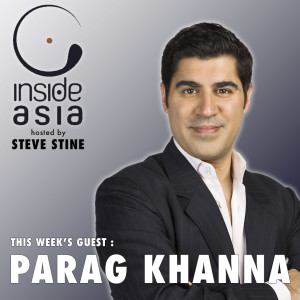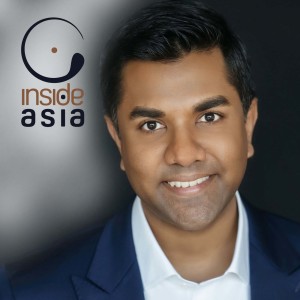Episodes

Thursday Mar 07, 2019
Stanley Samuel : Solving Asia’s Water Crisis
Thursday Mar 07, 2019
Thursday Mar 07, 2019
Water permeates all things. It’s the backbone ingredient to the food we eat, the clothes we wear, and the sanitation we’ve come to rely on. According to Stanley Samuel, it’s high time to re-evaluate the importance and the value we place on this prized commodity.
Through his company ECOSOFTT, Samuel has set out to address both the over-consumption and under-consumption problems associated with water.Depending on the location and the circumstances, he and his colleagues use a combination of for-profit and not-for-profit approaches to drive water conscious behavior.
Will this hybrid model a la ECOSOFTT prevail? Learn more by listening to our conversation.

Thursday Feb 28, 2019
Raja Samu Samu VI : The King of Kings
Thursday Feb 28, 2019
Thursday Feb 28, 2019
This week’s guest is Raja Samu Samu VI of Maluku, the current Secretary General of the Association of Indonesian Rajas and Sultans - along with his public relations and project advisor, Rex Sumner.
While the Raja’s role in Indonesia is largely – if not entirely- ceremonial - he has designs on brokering a new set of local-foreign partnerships to improve and showcase all that Indonesia has to offer. Agribusiness, sustainable farming, urban renewal and cottage industries are all initiatives receiving his time and attention.
My encounter with the Raja made for a different kind of Inside Asia episode - a diversion from our normal fare, but still fabric to the story we call Asia.

Thursday Feb 21, 2019
Stephen Langton: Remaking Boards
Thursday Feb 21, 2019
Thursday Feb 21, 2019
Whatever your impression about the conventional "Board of Directors", its make-up, breadth and accountability are all about to change. That’s the view of this week's guest, Stephen Langton - head of the Board & CEO Advisory Group for the Asia Pacific region at Russel Reynolds Associates.
Langton says – perhaps surprisingly – that Asia is making a play to lead reforms in Board effectiveness. He says that in many countries in the region, governments, customers, shareholders, and citizens are demanding more from corporations and calling out Boards to do more and drive results.
Boards are increasingly being called to task on the so-called “social license to operate” or SLO. But are companies ready to deliver something more than customer value and think in broad terms about environment, community and the greater social well-being? Find out by listening to our full conversation.

Thursday Feb 14, 2019
Parag Khanna : The Future is Asian
Thursday Feb 14, 2019
Thursday Feb 14, 2019
There are periods of time when the stars align for every part of the world, and Asia has those stars aligning today, says Dr. Parag Khanna, founder and managing partner of FutureMap, a data- and scenario-based strategic advisory firm.
Khanna is a recognized commentator on Asian geopolitics. He appears regularly at global forums, government gatherings, and closed-door briefings. He’s also the author of a new book, The Future Is Asian: Commerce, Conflict, and Culture in the 21st Century, in which he tries to correct what he sees as an excessive focus on the rise of China in world affairs.
The countries of Southeast Asia, he argues, are left in China’s shadow, and that he says, is a failed assessment of the region’s potential.

Sunday Feb 10, 2019
Ravi Agrawal: India's Smartphone Revolution
Sunday Feb 10, 2019
Sunday Feb 10, 2019
Just as the automobile transformed the lives of Americans 100 years ago, so the smartphone is having the same effect on the country of India. That’s the view of Ravi Agrawal, Managing Editor of Foreign Policy and author of India Connected: How the Smartphone is Transforming the World's Largest Democracy.
Smartphone sales may be slowing globally, but not in India. It’s the second largest phone market in the world after China with over 430 million users. And still, that only accounts for 45% of the addressable market. In other words, while demand for smartphones in most parts of the world is slowing, the appetite in India is accelerating.
To grasp the significance of the meteoric growth of smartphones in India, I asked Ravi to put things in context. What does it mean now and what could it mean in a few years’ time when smartphones become ubiquitous?

Monday Jan 21, 2019
Bob Manning: US-China Relations
Monday Jan 21, 2019
Monday Jan 21, 2019
If you’re wondering why we spend so much time on the program addressing US-China relations, it’s because we believe it serves as a bellwether for a shifting world order. While China flexes its newfound geopolitical muscle with sights fixed fast on global markets, the moon, and more, the US appears mired in a crisis of national confidence. US headlines these days speak less of global outlook and more of walls and protectionism. Indeed, the American pioneering spirit appears to be beating a retreat. And at the risk of oversimplifying things, it is the juxtaposition of China vs. the U.S. that symbolizes to the world an inevitable shift in power.
To discuss this – and more – I’m joined by Bob Manning, Senior Fellow at that Atlantic Council in Washington, D.C. Bob has made a name for himself reflecting on some of the big geopolitical shifts in our time and its impact on the U.S. Getting his perspective on the changing temperament in Washington vis-à-vis China is the subject of our discussion
These days it’s downright fashionable to criticize China. In the US capital’s corridors of power, there’s no love lost for the People’s Republic. “Arrogant,” “over-reaching,” “hegemonic,” are all words to describe China and its preeminent leader Xi Jinping. It’s not so much what China does, but how it does it that gets other world leaders up in arms. With respect to the U.S., it’s a matter of national ego – if there even is such a thing. What the US really appears to want is a handshake and a thank you from the Chinese leadership.
My guest this episode is more conciliatory. While he too sees legitimate reason to criticize China for gaming the system to get what it wants commercially and politically, he feels that the U.S. would do well to first get its own house in order. “Instead of whining about China,” he says, the U.S. should be figuring out how to compete with them.”

Thursday Jan 10, 2019
Elizabeth Economy: US China Tensions, Huawei, and Xi Jinping's Coming Challenge
Thursday Jan 10, 2019
Thursday Jan 10, 2019
Tensions between the United States and China continue to simmer amid trade negotiations, global influence, and the recent arrest of Huawei's CFO in Vancouver.
For context on where things are and where things might go from here, I spoke with Elizabeth Economy, the C.V. Starr Senior Fellow and Director for Asia Studies at the Council on Foreign Relations, a visiting fellow at Stanford’s Hoover Institution, and, of course, an acclaimed author—her most recent book is The Third Revolution: Xi Jinping and the New Chinese State.
We discuss the escalating tensions surrounding the US/China trade agreement and the HuaWei situation and its potential ramifications.
I ask Elizabeth if the the Trump Administration is executing a coherent foreign policy aimed at containing Chinese incursions, or something more reactive—simply a way for the Americans poke Huawei until it gives in to its demands.

Saturday Dec 22, 2018
Sam Tsui: China's Overseas Investments
Saturday Dec 22, 2018
Saturday Dec 22, 2018
This episode I’m speaking with Sam Tsui, Managing Director of Evolution Advisors, a boutique advisory and investment firm specializing in helping corporates and investors find and and execute on deals in Asia. Before that—for about a decade—Sam worked for Microsoft, identifying acquisitions and partnerships across Asia Pacific.
Our topic this episode: China’s global expansion. Trump’s attempts to curtail it in recent weeks has riled the Chinese in recent weeks, but can anything stave off the Mainland’s appetite to grow their presence?
For some, the thought of a walled-in China as an imperial power may seem like a novelty, but to the people and nations of Asia Pacific it’s a matter of historical record. For thousands of years, the Chinese were on the move, welcoming tribute from its smaller neighbors. Are we seeing the aspirational engines of Chinese ambition beginning to turn again? Where landgrab and patronage served the interests of Imperial China in centuries past, it’s now data that seems the target.
We’ve talked about the power and delicacy of data on previous programs. In my discussion with Ogilvy’s Chris Graves we looked at how – with enough data – behaviors can be shaped and manipulated. In our episode with Anurag Banerjee, it became terrifying apparent how data can be leveraged for good and evil. We’ve also spoken widely with the likes of Fortune’s Clay Chandler, The Conference Board’s David Hoffman, and many others about the rise of China Inc.
But how real is this? And where does xenophobia enter in? The way the world portrays a country in the eyes of the consumer means something. So it is that as the US and other nations stoke fears on China, reservations naturally rise.
How does the growing anti-Chinese rhetoric impact China’s overseas investment strategy? This is the shape of the cultural clash that Chinese capital runs into when it moves overseas. How China reshapes its image abroad may tell us more about its potential for future success than any amount of money it could throw at overseas buying opportunities.
As always, thanks for listening.

Tuesday Dec 11, 2018
Stephanie Dickson: Green is the New Black
Tuesday Dec 11, 2018
Tuesday Dec 11, 2018
Fashion is an industry that depends on fast and frequent shifts in taste. To keep up with consumer demand, brand-name makers of clothing and accessories have developed a habit of using cheap, sometimes unethical, labor to drive production. Environmental concerns have also fallen to the wayside. The fashion industry is the second biggest polluter in the world, according to some. Landfills everywhere are piled high with textile waste and toxic chemicals that are used in the manufacture of the new clothes we buy.
My guest this episode is trying to change that.
Stephanie Dickson is a fashion industry marketer turned sustainability activist. Her latest venture is Green is the New Black, a festival for conscious suppliers and buyers of fashion products.
She’s making a real difference in a specific industry, and the important thing to know is that she’s not alone. For her—as for many millennials—the refusal of the status quo, to simply accept the byproducts of business as usual is also refusal to turn a blind eye to the environmental and labor abuses that have been understood as necessary in the fashion industry. There’s a consciousness and an intent on asking the questions that, for years, have been understood as unaskable.
I think of my own generation and how we assumed there would be trade-offs. Making high-quality products at low prices means using resources – and lots of them. But not Stephanie. She believes the system can be changed—from within. It’s a fascinating discussion. What we’re seeing is a movement of educated and outspoken professionals more interested in building up what we have rather than tearing down all we’ve got. Armed with smart phones and clarity of purpose, this generation will use the tools of Capitalism’s making to make the Capitalists accountable.
As always, thanks for listening.

Wednesday Dec 05, 2018
Anurag Banerjee: The Social Impact of Artificial Intelligence
Wednesday Dec 05, 2018
Wednesday Dec 05, 2018
This episode we focus on the utopian side of artificial intelligence. It’s not a subject you hear much about these days, and this program is no exception. Our guests have had a lot to say about AI’s possible horrifying applications. But like most things, there’s another side. In this episode we turn to AI’s better angels—and see if we can believe in them.
My guest is Anurag Banerjee, Founder and CEO of QUILT.AI, an early-stage tech and consulting firm that merges machine learning with human and cultural intelligence to create insight for good and for profit. It’s a fascinating conversation.
I find myself wanting desperately to believe that AI can cure our most complex social and cultural challenge, and to worship at the altar of AI Altruism. And certainly there’s a great deal that might be possible.
But it won’t come for free. We must sacrifice privacy in return for insights that could change our world. And it might be worth it. Anurag Banerjee believes that technology – powered by AI - can connect us and solve society’s biggest problems. Our machines know us. They know what we want before we do. That’s a boon for any organization with something to sell.
But what about the ability to save someone’s life? Intervene in a crisis? Prevent a terrorist attack? Or slow the rate of suicides? Will large corporations with profit-hungry shareholders go toe-to-toe with tiny start-ups wielding AI sling-shots? That depends on your mind-set and whether you see the future as utopian or dystopian. Me? Well, I’m on the fence. How bout you?
This is not an episode to miss. Thanks for listening.

